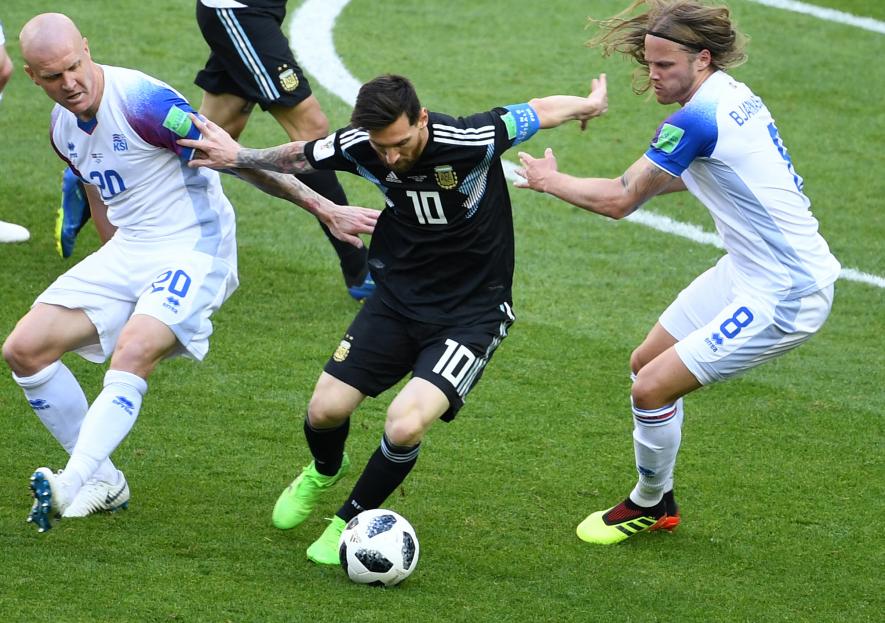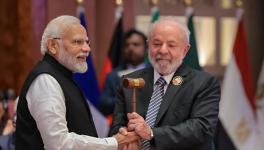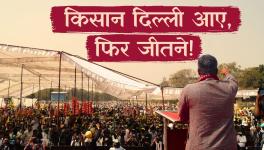Renedy Singh: Why Argentina has Flattered to Deceive in the World Cup

Argentina's lack of cohesion and team spirit at the FIFA World Cup has left Lionel Messi's World Cup dream in tatters. Image courtesy: IANS
There has been a lot of talk about the performances of the big, favoured teams such as Brazil and Spain in the group stages. Their bluntness in front of goal has copped a fair amount of criticism from pundits and fans alike. I am not jumping on that bandwagon.
National teams come together for a very limited amount of time in a calendar season. Players who play for different clubs, in different systems and different styles all come together and have to quickly work as a collective to fetch results. The key then is to adapt early to the style that the coach wants to play. The collective that can adapt best is the collective that will do well in the long run.
In the case of both Brazil and Spain, their performances have been panned without perhaps giving enough credit to their opposition. Against Switzerland -- a team that historically they have struggled against -- Brazil’s famed attackers faced a Red defensive wall. On Friday, it took two very late goals to give them the three points. In Spain’s case, the wall was Iranian. This has been the trend of the World Cup. Underdog teams have come together as a collective fast, and adapted quickly.
Against Costa Rica, Brazil struggled to create anything for a majority of the game. The prime reason for this was their opponents’ superb defensive organisation. The Costa Ricans had eight or nine players regularly parading around their box, and all of them parked in their own half. In this case, it becomes extremely difficult as an attacking team to break down the spaces and create something.
Spain struggled against Iran in similar fashion. Despite racking up the highest number of passes for any team in the first half of that game, they had zero shots on target and had created almost next to nothing. In fact, the first chance of that game fell to Iran, and, my feeling is, if the shot had flown into the net rather than onto the side netting, Iran may have taken the three points and left Spain staring down the barrel. As it was, that didn’t happen.
But it illustrates the points I’m trying to make. Defensive organisation, a prime job of any coach, has been put on a pedestal in this World Cup. The credit for Iran’s tactical nous must go to Carlos Queiroz, their coach; the team has adapted to his style perfectly. The question though is: Will Iran be using this same style at the AFC Asian Cup next January when they play against opposition significantly lower than them? Obviously not. They will be expected to attack. And that can sometimes create problems.
Take the example of Iceland, a footballing nation that has within three years become famous for its resilient, dogged defensive collective structure. In any game they go into, they are usually playing counter attacking football, happy to absorb the pressure before converting the few chances that fall their way. Against Nigeria, though, they went in as favourites -- Nigeria being the youngest team at the World Cup -- and the onus to attack fell on them.
It didn’t sit well with them, and, despite having a few creative players in their squad, they were finding it difficult to break their opponents down. Furthermore, the desire to go upfront meant their organisation at the back suffered and they conceded two goals that, in normal circumstances, they perhaps would never have.
The demands of international football are very different to club-level football. At this level, the highest level, players are tuned to switch on and off to different strategies at different times. They should be prepared to shift to whatever the manager demands. And most training-ground work in the national side revolves around such scenarios.
Argentina, disastrously, haven’t managed to do that yet in this World Cup. Despite boasting a glut of individual talent, they have failed as a collective for Jorge Sampaoli. The tendency when teams lose is to blame the manager, and, predictably, Sampaoli has taken a huge amount of flak for his team selections and strategy. But the truth also is that Argentina’s players, whenever they have been given an opportunity, have failed to justify his faith in them.
The group stages of any major global event are bound to be low-scoring, as bigger teams are a little cagier around smaller opponents. This comes out of a lack of team chemistry -- which is still building -- and also a simple desire to just get the job done and go through to the next round. The knockouts of the FIFA World Cup will definitely be a more open affair, and I’m looking forward to it.
[The author represented India through 1998-2011. He is an AFC A-licensed coach and heads the Football Players’ Association of India]
Get the latest reports & analysis with people's perspective on Protests, movements & deep analytical videos, discussions of the current affairs in your Telegram app. Subscribe to NewsClick's Telegram channel & get Real-Time updates on stories, as they get published on our website.
























